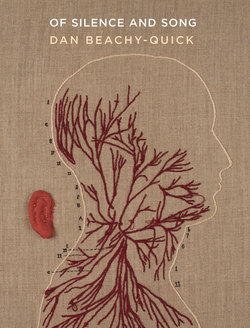Читать книгу Of Silence and Song - Dan Beachy-Quick - Страница 33
На сайте Литреса книга снята с продажи.
Оглавление23.
In the Paleolithic Age humans begin the work of representation. What they hunt and what hunts them, bird-headed shamans, mastodons, bulls, horses, all appear, and often with great subtlety of form, on the walls of the caves. I like to think they painted the images in the mind that only later we’d find to be our own. There is little evidence that the men and women who made these images lived in the caves where they painted. Life seemed to happen elsewhere. The images lived in the cave alone.
More than the animals, more than the occasional geometric pattern, what fascinates me most are the portraits of humans themselves. The portraits aren’t of faces.
Lovely when the anonymous reveals itself as the intimate, when identity isn’t a marker of unique self, but the self that here occurred. Not the recognition of a face, but the fact of a hand.
More moving still, these hands weren’t painted onto the rock. Mixing ochre or soot with water and putting it in the mouth, the artist put his hand on the stone and spat out the ink that would mark his presence not by painting it in, but by leaving it absent.
The hand that made this silhouette has gone missing, and only its absence remains. It exists by showing forth its own being forgotten, ghost-figure pointing back at the body that made it, its own absence most profound predictor of each human’s common fate, that against all time for most of it we have been missing.
Might it be true to say that the hand is a truer portrait of humanity than the face could ever be? That I grope my way toward being long before I open my eyes to the light in it? That the face can only stare out at the one approaching and through the nakedness of its own gaze say, Thou Shalt Not Kill, knowing all the while that being killed is what happens to a face, by other hands, or by one’s own, or by the hand of time.
Or it’s simpler, less violent, less dark. To be human is to be a made-thing, and the hand is the tool of our making.
I mean to say I cannot see my own face.
But I can see my hand.
Maybe that’s the first thought.
This hand I’m holding in front of me is me. Impossible to tell by looking at the images of the hands in the caves if they were held palm out or palm against the rock.
I’d like to say palm out.
Then the palm is the first mirror. It goes missing when you make a fist or when you die. To paint it is to make it go missing before you go missing yourself. I can’t tell if it offers a welcome or a warning, greeting of the upheld hand or command to stop, if it says stay back, back from this rock wall; or if it says the opposite, come, come, walk into the stone and find out how there to make your next home.
William Wordsworth, in another effort at portraiture of the human, questions: “I ask what is meant by the word Poet? What is a Poet?” In ancient Greek, poet comes from the verb “to make, to do.” Word of the hand more than the mouth. The poet is a hand that acts like a face: it speaks, it thinks. He goes on:
He has added a disposition to be affected more than other men by absent things as if they were present; an ability of conjuring up in himself passions, which are indeed far from being the same as those produced by real events, yet (especially in those parts of the general sympathy which are pleasing and delightful) do more nearly resemble the passions produced by real events, than anything which, from the motions of their own minds merely, other men are accustomed to feel in themselves:—whence, and from practice, he has acquired a greater readiness and power in expressing what he thinks and feels, and especially those thoughts and feelings which, by his own choice, or from the structure of his own mind, arise in him without immediate external excitement.
Deep in the riddle the poet lives, where absence is present and presence grows absent.
Maybe it’s like holding water or sand in cupped hands; maybe it’s like holding ink in the mouth, wondering whether to swallow or to spit it out.
